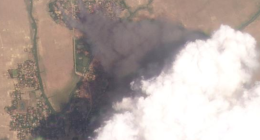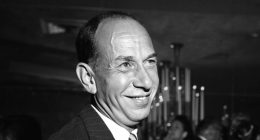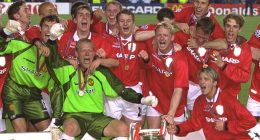When The Other Black Girl hit bookshelves June 1, 2021, it was already a phenomenon. The manuscript went through a 14-way auction, eventually landing at Atria for a seven-figure deal — and an adaptation was already in the works at Hulu after a similarly competitive bidding war. The novel became an instant New York Times best-seller.
Zakiya Dalila Harris wrote the thriller (her first) from her own experience as one of two Black people on her floor of the Penguin Random House offices, where she worked as an assistant editor. The book’s protagonist, Nella, is drawn to new hire Hazel in hopes they can bond over racism at the fictional Wagner Books before realizing that Hazel has sinister intentions.
Harris took a break from writing her next novel to speak with THR about what it’s been like to work on the adaptation — which premieres Sept. 13 on Hulu and counts Rashida Jones as an executive producer.
What has changed the most in your life since the book came out?
Talk to my therapist! (Laughs.) I think besides feeling financially stable which, when I was in my early 20s never felt like a possibility for me, the biggest thing has been learning how to advocate for myself in every arena. With this level of success, that I still can’t believe I have, it can be hard to stay true to yourself, but I’m able to push back when it feels right to push back. I’ve had to sit down with myself and be like, this is what you want, so say it is what you want. I don’t want to have regrets in that regard.
In doing all of the press and reader events for the novel, have you noticed anything specific that readers most want to talk to you about?
The thing people definitely comment on the most has been the ending. People want to know why I decided to write it that way, and I’ve had a lot of people mad at me. (Laughs) I was proud of that response because it meant people wanted to talk about it.
Given that your novel has a fair amount of autobiographical elements, insofar as your previous work experiences and how those felt, was it hard to give it over to a whole group of people in making the show?
I feel like I said goodbye to the Nella in the book that I wrote when we started working on the TV show. So much of the campaign for the book, all the interviews and appearances I did, consisted of me talking about how my own experiences informed her. So I got to a point in the making of the show where I just needed to tell people, “A lot of the dissecting of Nella is very personal, but I’m making the active decision to divorce myself from her.” After that, I felt very much like, the show is different from my own journey of writing her to begin with.
The book was sort of shot out of a cannon, publicity-wise; do you have any insight as to why it resonated so much, specifically with Hollywood?
I hate the word timely, but there was a timeliness of what’s happening in the story, especially in terms of the main character questioning, “Is my worth at this company simply the fact that I’m a Black woman? When I’m so much more than that?” I can’t speak to what exactly kept the project moving, but it does seem like Nella’s desire to succeed and feel a belonging in the workplace is something a lot of people can relate to and has been helpful in keeping this afloat. I also know that behind the scenes, Rashida [Jones] has been such a champion and a force for this project. It’s really hard to make something when you’re an author and not established in the world of Hollywood. Having her has helped keep the momentum going.

Did you have to fight to be a part of the making of the show? It’s still sort of rare for authors to work on their adaptations so closely …
That was actually very easy for me, and I realize that it puts me in a relatively small camp. What drew me to working with Temple Hill, our production company, in the first place was that they wanted me to be as much a part of it as I wanted to. I have no idea what I would have done if they hadn’t vocalized that; I don’t know how hard I would have fought to be part of it if they didn’t want me to be.
Can you talk a little bit about the casting process?
I’ll never forget the first day we started doing casting (on Zoom). It felt so magical to see women reading for Nella and Hazel. I started to see very quickly what I thought worked and didn’t work for the roles. There were so many great auditions for Nella, but when I saw Sinclair [Daniel] I was just so blown away because she was able to convey so much on her face. Humor, despair, contemplativeness, in the span of milliseconds. I felt a deep empathy for her immediately. I think what I said to the showrunner was, she has such an open face. From the way she’s written in the book, the character could have been very pensive, nerdy and awkward, but Sinclair is so charming.
With Hazel, we wanted the show to show them as friends, or show the possibility of them as friends, that we don’t really see in the book. We wanted to give them a functional and believable relationship so we could tear it down. When we met Ashley and heard about what the role meant to her, it was like, this is it. They have such a good chemistry together.
The white characters on this show are representative of a whole spectrum of bad behavior, from microaggressions to, I guess we could call them macroagressions. Was it hard to find actors who were able to skewer this white fragility without going too far into a caricature, but also without getting defensive?
The characters of Sophie and Vera were fun to watch because in the final episodes they’re so much different than they were in the book. We didn’t want to make them completely clueless, but they did have to be a little funny. The actresses [Kate Owens and Bellamy Young] had to be able to not take themselves too seriously. We had a lot of talks about what to do with Vera, since she starts out as a villain in the first couple episodes — we didn’t want it to be a message of, all white people are bad. That’s not the reality of my experience.
The book was published after the racial reckonings of 2020, when the publishing and entertainment worlds were in the midst of DEI overhauls that, now that the show is coming out, have largely fizzled. Does that feel prescient to you?
Unfortunately, this is the reality in the book, too, that it’s sort of a cycle. Black women, we’re brought in for a specific reason, then kicked out when we don’t adhere to a certain set of rules. We did our best to update the show so that it felt a little bit more like it happened in 2023 — the conversation about race is more upfront, but it feels as if things haven’t actually changed. When I’m feeling really pessimistic, I can see the book and the show as a self-fulfilling prophecy. But I’m also excited about what the show represents — there are so many Black actresses and so much new talent. Even though the show portrays an industry that can be really frustrating, I’m hoping the show itself can be something positive for viewers.
Interview edited for length and clarity.
This story first appeared in the Sept. 6 issue of The Hollywood Reporter magazine. Click here to subscribe.
Source: Hollywood








